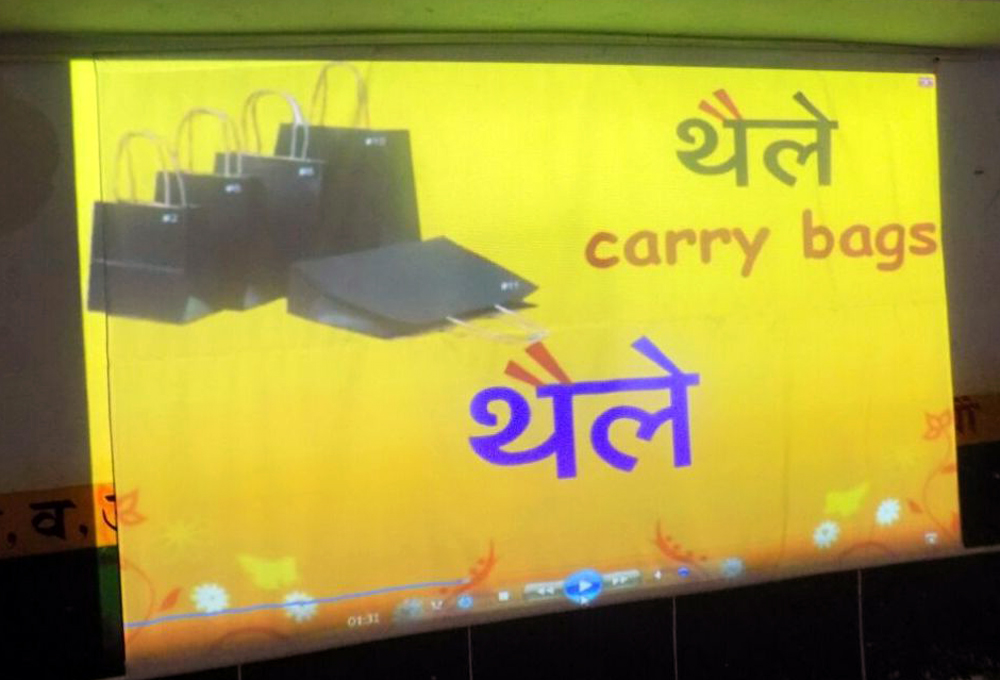
It’s Monday morning (January 30) and six-year-old Roshni Sahu is in a hurry to get to her school in Kapsi village of Balod district in Chhattisgarh. An animated, educational short film is scheduled for screening this morning at school and Roshni wants a front row seat.
Roshni is a Class I student at Kapsi Government Primary School. The school has replaced its blackboard with a projector, has internet connectivity and teachers use a laptop to teach students.
A digital revolution is sweeping through 47 government primary schools in Balod, transforming the way students, teachers and parents view education
Roshni is not the only student in rural Chhattisgarh getting a chance at digital learning. A digital revolution is sweeping through 47 government primary schools in Balod, transforming the way students, teachers and parents view education.
Her father, Shivkumar Sahu, the panchayat secretary of his village, says government schools in Balod are giving private ones a run for their money. In fact, he admitted his daughter to the government school after what he calls an “unproductive” year in a private school.
“My daughter wasn’t able to learn anything in the private school. She was getting duller day by day,” says Sahu. He paid a steep Rs 27,000 for her year in the private school whereas the government school is completely free.

He is happy with her progress at the public school which offers digitally aided “smart classes”. “The smart classes have changed her. Roshni can identify letters and count. She can even spell ‘elephant’ and recite English poems fluently. And she’s only in Class I!” says a beaming Sahu. “At home, she teaches her younger sister using her mother’s mobile phone,” he adds.
Each of the 47 schools has a projector and a laptop, donated by gram panchayats and individual villagers. The syllabus and the study material are decided on by the teachers. “Sometimes we use Youtube content,” says Neel Kamal Thakur, a teacher at Kapsi Government Primary School.
“Last year, after 12 students dropped out, student strength fell to 60. But after smart classes were introduced, we admitted 34 new students. The strength now is 94” — Neel Kamal Thakur, teacher
The digital classes are also helping improve the civic sense and awareness of students, he says. They now understand the importance of cleanliness and the harmful effects of plastics on the environment. “They saw a documentary on Youtube and now they’re learning to make paper bags,” says Thakur.
District collector Rajesh Singh Rana has had a big role to play in ushering in the digital revolution in Balod’s government schools. “A year ago, we started using projectors in 47 of 140 schools in the district. Things have gone well so far. The dropout rate has fallen since we introduced the projectors,” says Rana.

Thakur validates this. “Last year, after 12 students dropped out, student strength fell to 60. But after smart classes were introduced, we admitted 34 new students. The strength now is 94!” says Thakur. Attendance has also gone up, he adds.
But there are infrastructural problems like inadequate electricity supply and teacher training that Rana and the village community can’t address.
“Electricity is the biggest challenge in rural areas for schools trying to introduce tech-based training,” says VP Niranjan Aradhya, fellow, Centre for Child and the Law, National Law School of India University.
“Besides, most teachers lack computer knowledge. Unless the effectiveness of such computer-based training is measured and monitored, one-to-one direct engagement between teachers and students would be more beneficial than technology,” he says.
Subscribe to FactorDaily
Our daily brief keeps thousands of readers ahead of the curve. More signals, less noise.
To get more stories like this on email, click here and subscribe to our daily brief.
Photos: 101Reporters Pictures Photographer: Kishor Sahu Updated on February 13, 2017 at 7.30pm by adding Roshni Sahu's photograph. The 'Tech Meets Bharat' series brings to you stories on how technology is impacting and changing lives in hinterland India. Kishor is a Balod, Chhattisgarh-based independent reporter and Saurabh Sharma is based out of Lucknow. Both are members of 101Reporters.com, a pan-India network of grassroots reporters.








